In the Name of the Law

What laws have countries decided are critical for the well-being of the human race?
International law covers issues such as global economics, human rights, the environment, and armed conflict. A system of treaties and agreements ties countries together in a mutually beneficial web of consequences.
Who makes and enforces the laws where you live? If you live in the United States, the U.S. government makes the laws. If you live in Canada, the Canadian government creates laws. Traditionally, countries have the authority to decide what laws they need. Their police forces and judicial systems enforce these laws. This has worked for many years.
In most countries, a government makes the rules that citizens follow. In the United States, national laws are created by the legislature. This is our Congress, which has two chambers, the Senate and the House of Representatives. Laws are interpreted by the judiciary, the system of courts that includes the Supreme Court. Enforcement of U.S. law is by the executive branch of government.
If necessary, the government uses the police to force citizens to obey the law. For example, if someone is driving on the wrong side of the road or breaking the speed limit, the police can stop and fine them.
As globalization increases the number of interactions between people and countries, countries are required to rethink what laws are needed. Who should make these laws and how should they be enforced?
International laws govern the way countries behave with each other and, in some cases, how they treat their citizens. Years ago, international law primarily dealt with relations among nations during war and with diplomacy. As the world has become more connected, international law is quickly expanding in scope.
Today’s international law covers areas such as trade, bankruptcy, intellectual property, and banking procedures. In addition, governments are cooperating to develop a worldwide criminal code to bring some of the world’s most notorious international criminals to justice.
For many years, international law was difficult to enforce. There was no global police force or judicial system to enforce the laws. Today, new global legal institutions, such as the International Criminal Court and the International Court of Justice, have the authority to hear cases involving international law. In some instances, local governments are passing laws that follow international standards, which local police forces can enforce.
As international law expands, some large law firms are entering into partnerships with firms in other countries to create mega practices that can serve global clients on global issues.
Treaties can go by many names, including conventions, charters, covenants, protocols, pacts, acts, statutes, and agreements.
The Peace Palace at The Hague in the Netherlands, where the International Court of Justice is seated
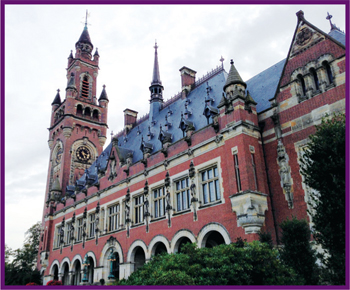
HOW IS INTERNATIONAL LAW CREATED?
Who makes international rules? The world does not have a single, unified government or legislature to create and enforce international laws. Instead, countries agree to act or not act in certain ways. There are two main sources of international laws: treaties and customary practice.
Treaties are the strongest and most official statements of international law. A treaty is a formal agreement between two or more countries. Treaties are like contracts in which the promises that countries make to each other are formalized in writing and signed by representatives of each country. Countries make treaties that cover any number of areas—from trade to the control of nuclear weapons.
Treaties can be signed by two countries in an agreement that is called bilateral, or by many countries, which is called multilateral. The written provisions of a treaty are binding, which means the signing countries can be held to the promises made in the agreement. Some treaties have their own rules for how they are enforced, while others are enforced by another agency, such as the International Court of Justice. The advantage of treaties is that they can be created quickly and clearly explain the law being created. A drawback, however, is that a treaty only binds those countries that agree to sign it.
Another way to create international law is through customary practice. Customary practices are established behaviors that a community has developed and accepts as rules. Countries have certain customs that have been developed and followed for many years.
Unlike a treaty, a customary law is not a formal agreement. Instead, it is based on what countries and leaders agree to do. When followed for long enough, these customs sometimes become international law.
For example, the law of diplomatic immunity protects diplomats such as ambassadors from being arrested or prosecuted in the countries where they are posted. This practice started as a custom, but is now part of international law. If a country harms a visiting diplomat, other countries see it as a violation of international law. All countries are bound to follow the law, even if they do not specifically consent to it. However, one of the weaknesses of customary international law is that it can be unclear and cause disputes.
WHAT IS THE FOCUS OF INTERNATIONAL LAW?
Much of international law focuses on four main areas: armed conflict, economics and trade, the environment, and human rights. These are areas that we, as a global society, have decided are the most vital to our existence.
Many laws govern actions before, during, and after a war. Some laws cover the legitimate reasons for starting a war, while other laws outline acceptable behavior during war. For example, international law recognizes that a country has the right to use force against another nation when acting in self-defense. In addition, international law states that self-defense actions should be proportional to the attack to which a country is responding. Yet interpreting these laws can be complex. What events justify self-defense? Who decides what is proportional?
For a state to be bound by a treaty, the state must ratify it, or officially consent to be bound by that treaty. Simply signing a treaty is not ratifying it.
Some people believe a country should attack in self-defense only if it has been physically attacked by another country. Others believe self-defense includes pre-emptive strikes against aggressive targets to prevent them from developing into a military threat. Once armed conflict begins, international humanitarian laws apply. Many of these laws are part of the Geneva Conventions, a series of treaties on the treatment of civilians, prisoners of war, and the wounded and sick during wartime.
Some international laws focus on economic matters—they set rules for how nations and multinational companies deal with each other. These laws create rules and regulations for trade, monetary policy, investments, and more. They set a level playing field so that everyone operates under the same rules.
Other international laws deal with the environment. What do you know about climate change and global warming? These are issues that affect everyone on Earth. Many people around the world understand that the globe has limited resources that should be protected by all nations, regardless of where a resource is physically located. International environmental laws bring countries to work together on issues such as sustainable development, biodiversity, endangered species, hazardous materials, climate change, and pollution. Treaties such as the UN Convention on Biological Diversity and the Convention on International Trade in Endangered Species are examples of this type of international law.
INTERNATIONAL HUMAN RIGHTS LAWS
While some international law governs the relationships among countries, human rights law governs how a country treats its own citizens.
The UN Charter and the Universal Declaration of Human Rights are the core of international human rights law. After World War II, the world was stunned by the genocide committed by Nazi Germany. For the first time in history, the international community agreed that serious violations of human rights should not be tolerated. It acknowledged that protecting human rights was not the responsibility of a single country, but was the responsibility of the entire world. The UN decided that a strong and unified declaration against human rights violations was needed to prevent future violations from happening.
On December 10, 1948, the UN adopted the Universal Declaration of Human Rights (UDHR). The UDHR lists, for the first time, the fundamental human rights that are to be universally protected. After the UDHR was issued, the UN called upon all member countries to publicize it so that the information could be shared, displayed, read, and discussed in schools and other educational institutions around the world. Although the UDHR is not a legally binding document, it has become a standard for countries around the world to follow.
As time passed, the UN has expanded human rights law to include specific standards and laws that protect women, children, people with disabilities, minorities, and other vulnerable groups from discrimination.
Listen to Eleanor Roosevelt, human rights activist and the First Lady from 1933 to 1945, read from the UDHR. Roosevelt was instrumental in drafting the declaration. Why is this document important? Do you think it’s any more or less important now than it was when it was written after World War II?
You can also read the UDHR here.
International treaties and agreements protect human rights for people around the world. Many agencies have formed to enforce human rights laws, including Amnesty International and Human Rights Watch.
Typically, countries are expected to prosecute offenders who commit human rights violations within their borders. International agencies, such as the UN or the International Criminal Court, only get involved when the country cannot or will not prosecute. For example, the UN is investigating human rights violations carried out on the people of Syria during its civil war. The Syrian government and the rebels fighting the government have been known to conduct mass killings and use chemical weapons on civilians.
Established in 2006, the UN Human Rights Council is made up of 47 countries and works to promote and protect human rights around the world. The council addresses human rights violations and makes recommendations to the UN, including responses to human rights emergencies.
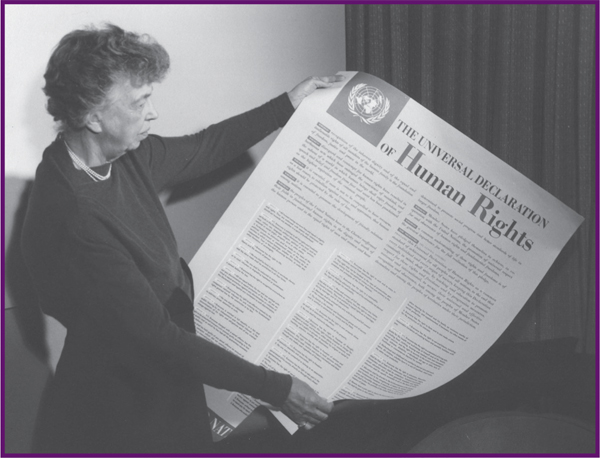
credit: National Archives
Every four years, the Human Rights Council reviews the human rights records of all 192 UN member states. The goal of this review is to improve human rights in every country. To achieve this, the review assesses each country’s human rights records and addresses human rights violations wherever they occur.
ENFORCEMENT WITH TRIBUNALS
Countries have police and courts to enforce their laws. But who enforces international laws? How do we ensure that countries around the world follow international law?
After World War II, the Allied powers—the United States, Great Britain, Soviet Union, and France—authorized an international military tribunal to prosecute Nazi officials for war crimes and other crimes against humanity. The tribunal was given jurisdiction over offenses that had no particular geographic location, crimes against human dignity, and crimes against specific persons.
The Allies conducted trials at Nuremberg, one of the few German cities that was not in ruins from the war. The trials of leading German officials opened on November 20, 1945, before the international military tribunal.
Twenty-two of these men stood trial in Nuremberg. On October 1, 1946, the judges returned their verdict. Twelve men were sentenced to death by hanging. Seven defendants were sentenced to prison, while three were acquitted.
The person most responsible for German atrocities during World War II never stood trial at Nuremberg. Adolf Hitler had committed suicide in the final days of the war.
Defendants at the Nuremberg Trials
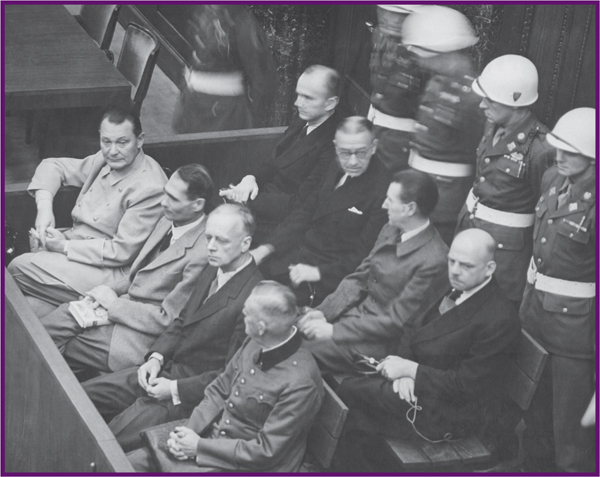
credit: U.S. Army
Similar trials were held in Tokyo to prosecute suspected Japanese war criminals. The Nuremberg and Tokyo tribunals provided a model for how war crimes, crimes against humanity, and other crimes could be prosecuted under international law. Since then, the UN has used tribunals to prosecute war crimes and genocide.
INTERNATIONAL CRIMINAL COURT
While tribunals can be used to enforce international law, they are generally temporary and set up to prosecute only a specific set of crimes. Some nations called for a permanent court to try cases involving war crimes, crimes against humanity, and genocide.
The International Criminal Court (ICC) was the result of a 2002 treaty called the Rome Statute. The ICC became the first permanent court for bringing to justice people who commit serious war crimes.
The ICC prosecutes individuals rather than nations. Unlike tribunals, the ICC is independent from the UN. The ICC takes cases from any country, but can act only in cases where nations are unwilling or unable to prosecute themselves. It also tries only cases involving the most serious crimes, including genocide, war crimes, and crimes against humanity.
As of 2017, 123 countries have ratified the Rome Statute. Some nations—including China, India, and the United States—have not ratified the Rome Statute or supported the ICC. These nations are concerned that the ICC may use its jurisdiction to conduct politically motivated prosecutions of their military and political personnel.
INTERNATIONAL COURT OF JUSTICE
The International Court of Justice (ICJ) is the judicial body responsible for resolving disputes between nations on questions of international law. The ICJ works to resolve conflicts peacefully that in the past might have led to hostilities. The court is made up of judges from 15 different nations and meets in The Hague, in the Netherlands. The ICJ conducts hearings and trials and issues legal opinions.
In one example, the ICJ heard a case that involved a territorial dispute between Israel and Palestine. Israel had built a wall in the West Bank territory to protect itself from suicide bombers.
Former child soldiers in the Democratic Republic of Congo
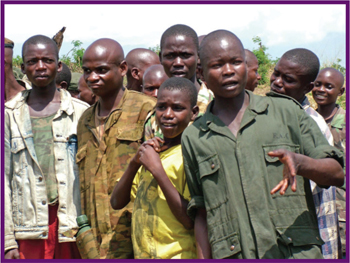
credit: L. Rose of the U.S. Agency for International Development
The ICJ, which is sometimes called the World Court, rules on disputes between governments but cannot prosecute individuals.
Reciprocity is based on the idea that “what goes around, comes around.” Have you heard this expression? What does it mean to you?
Palestine argued that the wall violated international law. The ICJ agreed and issued an opinion that the wall hindered Palestine’s right to self-determination, meaning its ability to freely decide its political status and freely pursue its economic, social, and cultural development. The ICJ’s decisions, however, are non-binding, and Israel challenged the ICJ’s authority in the case.
OTHER ENFORCEMENT METHODS
Some treaties have their own enforcement provisions defined in the document itself. Sometimes, a treaty resolves disputes through arbitration, a process where all parties present evidence supporting their claims to neutral mediators who make a binding decision. Other times, a dispute is referred to the ICJ to be resolved. When no enforcement method is defined, countries must use other methods to punish nations for not following international law, including reciprocity, collective action, and shaming.
If a country commits an offense against another country, it can expect the other country to retaliate with the same behavior. Simply knowing this can make countries think carefully about their actions. For example, one country will not kill prisoners from an enemy country if it does not want its own prisoners killed in retaliation. In trade, one country will not put high tariffs in place on another nation’s goods if it believes the other nation will retaliate with similar tariffs on its goods.
International law can also be enforced through collective action. Collective action occurs when several nations act together against an offending country to punish it.
Iraqi forces burned oil fields in Kuwait, causing major environmental and economic damage.
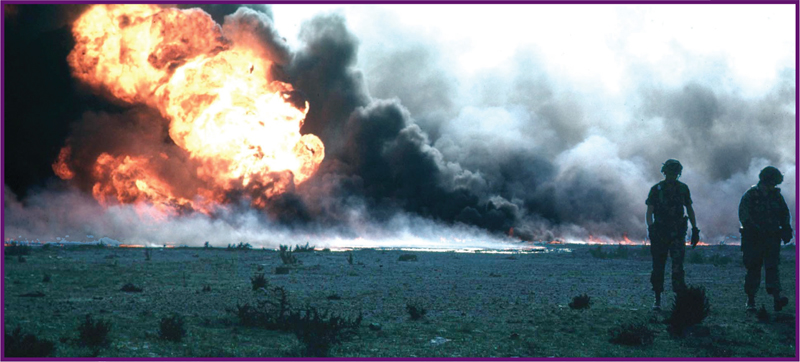
credit: Jonas Jordan, U.S. Army Corps of Engineers
When Iraq invaded the neighboring country of Kuwait in 1990, many countries around the world were upset. Working together through the UN, they condemned the invasion and coordinated joint military action to remove Iraqi forces from Kuwait.
Countries have also collectively imposed economic sanctions against a country. Economic sanctions are commercial and financial penalties, including trade barriers, tariffs, and restrictions on financial transactions. To push South Africa to eliminate apartheid, the practice of systematic racial segregation, the UN imposed economic sanctions on South Africa in the 1980s.
SOVEREIGNTY
For centuries, nations have been sovereign, possessing the right to create their own rules and handle their own affairs. As interactions between nations have increased and grown more complex, the nations of the world must learn how to best work together.
Write down what you think each word means. What root words can you find to help you? What does the context of the word tell you?
arbitration, bilateral, biodiversity, diplomat, genocide, judicial, jurisdiction, justice, multilateral, prosecute, ratify, reciprocate, tribunal, and veto.
Compare your definitions with those of your friends or classmates. Did you all come up with the same meanings? Turn to the text and glossary if you need help.
Sovereignty is the full right and power of a nation over itself—the people and property within its borders. Regardless of size, population, or economic status, all nations have the same rights to decide what happens inside their borders. And one nation does not have the right to interfere with the way another nation runs itself. This means that one nation cannot force another nation to take a specific action inside its own country.
Globalization is changing this idea of state sovereignty. Many countries view human rights as a global concern, not an individual country’s issue. Through international treaties, more countries are giving up parts of their sovereignty to give their citizens basic rights that are agreed upon by the global community. Countries are working together for a more just and healthy global community.
•Why is the environment one of the issues that the majority of the countries of the world are concerned about?
•What might the world be like if human rights were not respected? Has this ever been the case in human history?
•What do you think is the future of human rights? Do you think that people will decide other issues are more important?
INTERNATIONAL LAW IN THE NEWS
Stories that involve international law are in the news every day. In this activity, you will identify international law news stories and investigate the laws that apply to the issue.
•Read through a current newspaper. Identify several stories that involve international law. These can include the following:
•Bombings
•Terrorism
•Children or youth
•International business
•Environmental protections
•Human rights
•War or conflict
•International crime or criminals
•Refugees
•International trials or tribunals
•Sanctions
•Protests
•Choose one or two stories to investigate. Consider the following questions.
•What international law applies to the issues in the article?
•Do you think this issue should be governed by international law or handled domestically? Explain why.
•How is this law being enforced?
•Why was this method of enforcement chosen and do you think it is effective? Explain.
To investigate more, think about arguments against international law, especially as it applies to this issue in particular. Why would a country object to the law and its enforcement? How does the law affect a country’s sovereignty?
The UDHR has inspired additional treaties and agreements that protect human rights. On the UN website, there are nine core international human rights instruments. Each one is monitored by a committee of experts to ensure the treaty’s provisions are being implemented and followed by the states that have signed.
•You can see a list of these nine core human rights instruments on the UN website.
•Choose one of the instruments to explore in more detail. Use the internet and other sources to learn more about the instrument. Consider the following questions.
•What is the name of your treaty?
•When did the treaty come into force?
•What rights does the treaty protect?
•List three specific rights or freedoms guaranteed by the treaty.
•Is there a committee that oversees and monitors the treaty? What are the committee’s responsibilities?
•How has this treaty been used in international law?
•Have any international organizations used the treaty to advocate for the rights of certain people?
•Prepare a presentation to share what you have learned about the treaty for your class.
To investigate more, how has the treaty you learned about been enforced? What organizations are involved in enforcement? Has enforcement been successful? Why or why not?